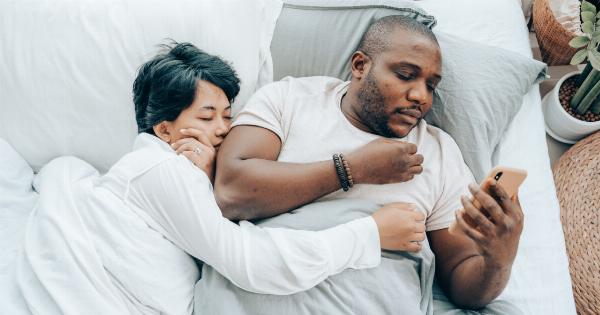Smartphones have become an indispensable part of our lives. We rely on them for a variety of tasks, from keeping in touch with friends and family to managing our work schedules.
However, this addiction to smartphones has resulted in a variety of negative impacts, including disruptions to our sleep patterns.
Blue Light Emission
One of the main reasons why smartphones can negatively affect our sleep patterns is due to the blue light they emit.
The blue light, also known as high-energy visible (HEV) light, has a short wavelength that affects the levels of melatonin, a hormone that regulates our sleep-wake cycles. Exposure to blue light suppresses melatonin production, making it harder to fall asleep.
Studies have shown that blue light emission from smartphones can disrupt the circadian rhythm, the natural biological clock that controls our sleep patterns.
As a result, using smartphones before bedtime can lead to insomnia, nighttime awakenings, and daytime sleepiness.
Increased Stress and Anxiety
Smartphones can also lead to elevated levels of stress and anxiety, which can contribute to poor sleep patterns. Constant notifications, messages, and news updates can create a constant sense of urgency, leading to persistent stress.
A study published in the Journal of Occupational Health Psychology found that people who were highly connected to their smartphones experienced more work-family conflict, which led to more sleep problems.
In addition, the stimulation created by smartphone use can interfere with our ability to relax and unwind before bedtime.
Instead of winding down, we are stimulated with information and entertainment, leading to a state of heightened anxiety and cognitive arousal.
Disturbance to Sleep Quality
Using smartphones before bedtime can also lead to a decrease in sleep quality. Research has shown that people who use smartphones before sleep have a lower quality of sleep compared to those who do not.
Furthermore, smartphone use before sleep has been associated with an increase in the number of awakenings during the night, leading to fragmented sleep.
In addition, smartphone use can prevent us from entering deep sleep stages, such as rapid eye movement (REM) sleep, which is essential for restorative sleep.
The stimulation from smartphones can cause our brains to remain in a state of light sleep, leading to feelings of grogginess and fatigue the next day.
Adverse Effect on Mental Wellbeing
The negative impact of smartphones on sleep patterns can also have a knock-on effect on our mental well-being. Poor sleep quality has been associated with an increased risk of depression, anxiety, and other mental health disorders.
Inadequate sleep can also impair our cognitive function, making it harder to concentrate and affecting our decision-making abilities.
In addition, smartphone addiction has been linked to a range of psychiatric symptoms, including mood disturbances, anxiety, and obsessive-compulsive behaviors.
A study published in the Journal of Behavioral Addictions found that problematic smartphone use was associated with sleep disturbances, which in turn, increased the risk of depressive and anxiety symptoms.
How to Improve Sleep Patterns in the Age of Smartphones
The negative impact of smartphones on sleep patterns is clear, but there are steps we can take to mitigate the effects. Here are some tips to consider:.
- Establish a digital curfew: Avoid using smartphones for at least an hour before bedtime to help your body prepare for sleep.
- Reduce blue light exposure: Use the night mode or blue light filter on your smartphone to reduce the amount of blue light emission.
- Create a relaxing bedtime routine: Engage in relaxing activities such as reading or meditation to help your mind unwind and prepare for sleep.
- Avoid using smartphones in bed: Reserve your bed for sleep and intimacy to help train your body to associate your bed with relaxation and sleep.
- Limit smartphone use: Practice mindful smartphone use and limit the time you spend on your device to avoid overstimulation and stress.
Conclusion
The effects of smartphones on sleep patterns are clear – the blue light emission, increased stress and anxiety, decreased sleep quality, and adverse effects on mental health are all significant issues.
However, by taking steps to reduce smartphone use before bedtime, limiting exposure to blue light and establishing a relaxing bedtime routine, we can improve our sleep patterns and optimize our overall well-being.































